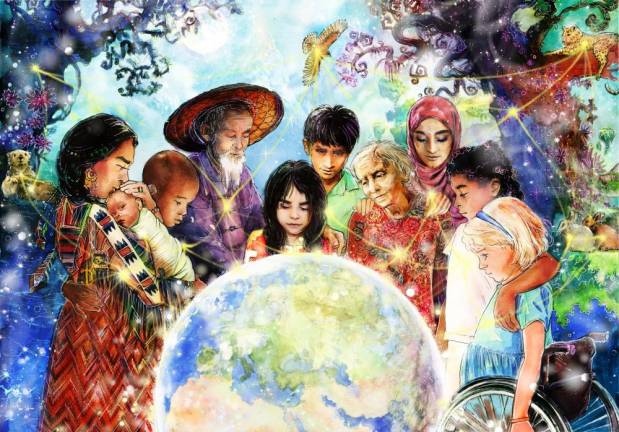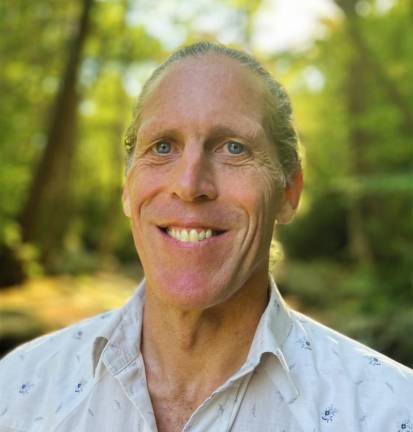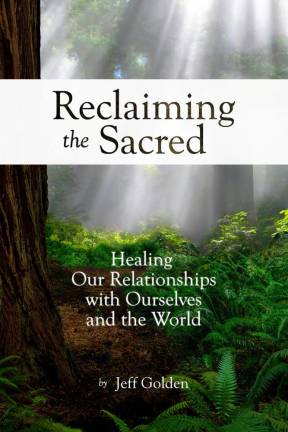How we all got duped
‘Reclaiming the Sacred’ offers urgent insight into what actually nourishes human wellbeing. What doesn’t? Money and possessions, which nonetheless hook so many of us.



Perhaps you’ve heard the expression, “We come into the world alone and we go out of it alone.” The idea is that we are ultimately, fundamentally, alone – that is the nature of us and the universe, and our job is to come to peace with it.
I remember a friend once saying this to me and I just nodded and thought about that: aloneness as an essential truth of being human, something we need to understand and embrace.
It was only later, when I found myself reflecting on her words again, that I realized how completely and absurdly I had been duped – not by her, but by our society. Her comment was consistent enough with the general worldview of the society around me that it not only didn’t strike me as ludicrous or deranged, as it should have, it rang true. It was like, “Yep.” I later did an Internet search and found dozens of people who have written, said, or sung some variation of this. Filmmaker Orson Welles took it to a whole other level, writing, “We’re born alone, we live alone, we die alone. Only through our love and friendship can we create the illusion for the moment that we’re not alone.” Ouch.
I imagine myself going back in time and being among some of my ancestors, speaking with some of them from millennia back, and telling them about this idea, explaining that not just one person but many people, an entire society, basically believes this to be true, experiences the world and themselves this way.
I imagine, at first, a complete disconnect, what I am telling them actually unfathomable. A chuckle, a glint of amusement in the eye, a dismissal with the hand.
“No, it’s true,” I persist. “Many people in that time really think and feel that way. I thought and felt that way about myself and the world, and often still do to some degree.” I imagine their continued inability to really comprehend what I’m saying. I imagine them pressing me:
But how can we ever be apart from the earth, from the trees and sky and waters? How can we ever be apart from the sun and moon and wind and other creatures? How can we ever be separated from our own hearts and the divine within us and within everything? It just isn’t possible.
And then a deeper wondering:
How could people just close their eyes to the obvious truth around them? How could someone cut off so much of themselves, just disregard their own feelings and knowing?
The truth, of course, as should be at least mildly obvious to anyone who cares to reflect on it for a moment, is that it’s just not possible to come into the world alone. Everyone one of us entered the world in the most profound and intimate of relationships with another human being. We spent months not just with that other being, but in and of that being. Everything we needed to survive and grow, everything that we were, we received through that person. The first light we saw was filtered through their body; our first tastes and smells were of that person and the food they ate, filtered through their amniotic fluid. The first sounds we heard were that person’s heartbeat, the air entering and leaving their body, their stomach, their voice.
The essential truth of our existence is not that we are alone, but that we can never for a moment be even remotely alone. We are inextricably in every moment connected to and sustained by other people, the world, the universe, our ancestors, the divine. In fact, if we want to understand the true nature of our place in the universe, we could hardly do better than the metaphor of being held in the womb. We spend our entire lives not just with the world, but of the world.
Consider the air. This world holds you in a body of air that continually provides you with the essential breath of life, something you could not take for granted throughout most of the universe. Through this body of air you are connected with almost every other living being on the planet. It is each breath entering your body, the gift of oxygen given to you by unknown plants in every part of the world, many long gone now. And it is each breath given by you, the gift of carbon dioxide to enter the bodies of unknown plants the world over, many long after you are gone.
Consider water. More than half your body is water, and half of that is exchanged every one to two weeks. That means a quarter of what will be your body in two weeks is right now evaporating off the surface of the ocean, a lake, the soil. Part of you is floating in the sky as part of a cloud, or is raining down amidst a storm. Part of you is right now within the body of another plant or animal, or dwelling in the cool darkness amidst rocks in the earth. And that is where a quarter of what is now your body will be in another two weeks.
Consider the 8.7 million species of plants and animals that have coevolved with us on this planet, and the dazzling flow of energy and interactions that collectively sustain us. Consider human society. You are held by countless people around the world, through the food you eat, the clothes you wear, the home you live in, the medicines and herbs you take. Consider the web of life within you, the 57 percent of your body that is made up of trillions of microbes that support your immunology, your digestive and reproductive systems, your skin, even your emotional well-being.
Consider how disconnected we and this society have to be, how tightly our eyes have to be closed, in order to conceive of aloneness as a core aspect of being human. Entirely the opposite of what Orson Welles wrote, belonging and connection are not temporary illusions; the great illusion/delusion is that we could ever really be alone in any fundamental way.
You exist, always, in vast, intimate and inextricable relationship. This is the hallmark of human existence; this is you.
Hudson Valley author Jeff Golden was awarded the Grand Prize at the prestigious Nautilius Book Awards for his 10-year labor of love, ‘Reclaiming the Sacred: Healing Our Relationships with Ourselves and the World.’ Previous Nautilus winners include the Dalai Lama, Brené Brown, Barbara Kingsolver and Thich Nhat Hanh. The book draws on the work of thousands of psychologists, economists, activists and poets to explore how we can all live happier and more purposeful lives by tackling climate change and other environmental problems head-on. The above adaptation from the chapter, The Shared Breath of Life, is reproduced with Golden’s enthusiastic permission.